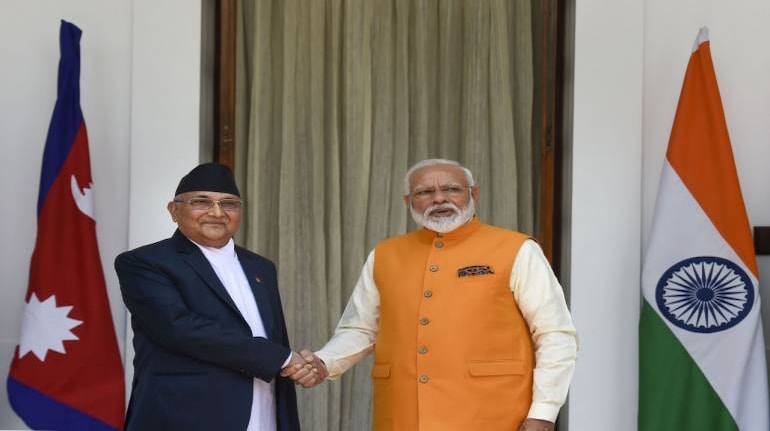



The middle class in India don’t generally see Kathmandu as ‘foreign’; instead viewing it as very nearly part of India, which is forgivable since Nepali citizens come and go freely, and can rarely be differentiated from our own diverse population.
Which is why many would have been shocked at recent tensions between the two countries, with Nepali Prime Minister Khadga Prasad Sharma Oli publicly upbraiding India. Worse, his government seemed determined to up the ante by issuing a political and administrative map that added 335 sq miles of Indian territory to its own, which included an area where Defence Minister Rajnath Singh had recently inaugurated a new road for pilgrims to reach Kailash Mansarovar.
All of this has placed the cat squarely among the pigeons. The disputed area, which includes Kalapani, Limipiyadhura and Lipulekh, are of vital importance to India, and Kathmandu knows it only too well.
Ongoing tensions with Nepal followed the re-designation of Jammu and Kashmir as a Union territory, and a new map of November that showed Kalapani as part of India. That reflected ground realities to the last inch. Nepali commentators observe that there was always a ‘gentleman’s agreement’ that issuance of any new map would be done after a quiet consultation with Kathmandu. Perhaps this was not done.
Then on May 8, Singh declared open an 80-km road to link up with Lipulekh, the gateway to Tibet. China would certainly have objected to that, as it now objecting with troops to roads to infrastructure in Ladakh. China has raised Lipulekh before. In 2018, Wang Wenli, a senior official dealing with Boundary and Ocean Affairs remarked “the Indian side has also many trijunctions. What if we use the same excuse and enter the Kalapani region between China, India and Nepal…”
That China has been making inroads into Nepal has been apparent for some time. Oli made a grand visit to Beijing in 2018, with a joint statement reiterating commitment to the Belt and Road Initiative (BRI) — a sure red rag to India — and identifying a range of bilateral projects. Nepal is hardly a thriving destination market for Chinese goods, which means that the real intention is strategic.
The visit of President Xi Jinping to Nepal followed, in the first by a Chinese President since 1996. The extent of Chinese influence in political circles became apparent in the unprecedented instance of the Chinese Ambassador to Nepal, Hou Yanqi, virtually mediating in an intra-party fight that threatened to bring down Oli.
The Chinese soothing down of political tensions was necessitated by consistent infighting in the recently-formed Nepal Communist Party (NCP). The NCP saw the surprising merger of the usually inimical Communist Party of Nepal (Unified Marxist Leninist) led by Oli, and the Communist Party of Nepal (Maoist Centre) headed by Pushpa Kumar Dahal or Prachanda. On paper the NCP government is the strongest ever to hold office in Nepal, but, power sharing has become an issue with Prachanda and other leaders increasingly side-lined.
Oli’s authoritarian tendency, apparent recently in the promulgation of two ordinances designed to give his more space for manoeuvre, further alienated the others. Prachanda has since teamed up with powerful leaders such as Madhav Nepal, Jhalanath Kanal and Bamdev Gautam, all powerful former comrades of Oli. Oli is in trouble, and his unusually harsh stance — which included a diplomatic note to the Indian Ambassador on the opening of the road, the issuing of the map, and claiming that the ‘Indian virus’ was more virulent than the Chinese or Italian strains — seems aimed at showcasing him as a nationalist leader.
This posturing was uncalled for, and so was Indian Army Chief MM Naravane’s statement that Nepal was acting at the instance of “another country”. India and Nepal share multifarious military links, all of which are precious. Nepal Army Chief Purna Chandra Thapa was far more sensible, when he was asked to reiterate with a strong rebuttal. General Thapa reportedly refused to be involved in a political matter, leaving the Defence Minister to issue a statement.
Then there is the manner in which the Indian bureaucracy has seen fit to deal with a friendly neighbour. Harsh statements on ‘cartographic aggression’ could have been toned down, and the Nepal Ambassador has yet to get an appointment with an Indian official. A quiet talk with the ambassador could surely have been arranged, at a time when most Nepali politicians are incensed at the charge of collaborating with China in particular.
It should be of interest that Chinese nationals, stuck in Nepal due to the lockdown, have since been caught on camera in clashes with Nepali forces, which was met with strong hostility by mainstream media. The Chinese embassy waded in to contain the issue, but the incident serves to show what is apparent in Pakistan as well — that Chinese presence is not always welcomed by the locals. There are several shades to this problem, and New Delhi needs to pick the one that suits its goals.
Nepal has been a loyal friend for decades, and Indian diplomacy needs to use tact rather than the overly big boss approach. This is not about China. It’s about our inability to use a time-tested friendship to prevent hostile countries from gaining this extent of political, physical and economic ingress. Middle class India may see Nepal as ‘nearly’ a part of India, but that mentality should not be allowed to pervade upwards. A proud Nepali nation deserves more.
Tara Kartha is former director, National Security Council Secretariat. Views are personal.Discover the latest Business News, Sensex, and Nifty updates. Obtain Personal Finance insights, tax queries, and expert opinions on Moneycontrol or download the Moneycontrol App to stay updated!
Find the best of Al News in one place, specially curated for you every weekend.
Stay on top of the latest tech trends and biggest startup news.